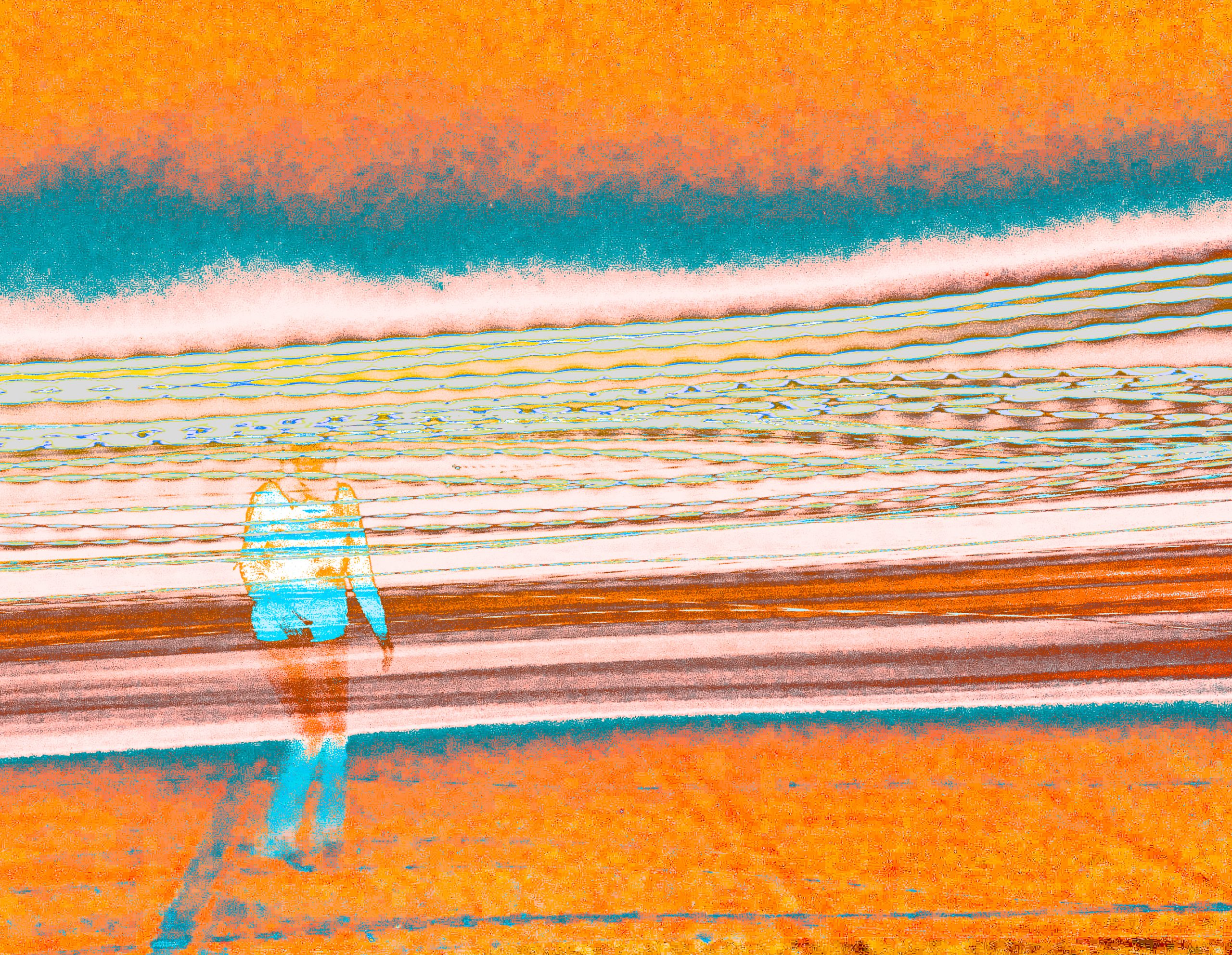Attachment Theory

art by Dan Rounds
During halftime, you and your friend walk laps of dirt road lipping the brim of the football field where junior high and high schoolers bandy about. You watch them sipping sweat off 20 ounce refreshment stand drinks and crunching popcorn the color of lemon rinds under high heeled, flip-flopped wedges and boat shoes. Legs bare and goosy, you’re self-conscious of the borrowed GUESS denim mini skirt you’re wearing courtesy of this friend—(Why don’t you try this tonight, instead? You’re fourteen, start dressing like it, babe!)—the one your father had eyed earlier as both of you slipped in the back seat of his 1998 gold Mercedes sedan. You’re proud of this car, proud of your dad and the consistency with which he performs his normal—a dad who looks and acts like other dads. He drives a nice car and keeps it preternaturally clean and these are traits you’ve clung to in recent months since your mother’s abrupt July departure. Your friend is pretty and smart and poised on the purlieu of the popular crowd, so you’re surprised and a little breathless when you realize she likes you enough to accept your invitation to get ready together. You are not popular, but having a friend like her is a valuable social commodity in the 8th grade. There’s something tragic about the shameless naivety of your scheming.
Where’s your mom? she asks earlier, while you both stand before your upstairs bathroom mirror holding CHI straighteners—hers black, yours pink—not making eye contact, because the process of smoothing your hair to the right amount of 2005 crispiness required of it is a taxing process, one you’re only now learning to master. She’s in the hospital, you say, because it’s the story you’ve come up with and resolutely stuck to for the past 2 months.
Your neck perspires under the wad of shoulder-sweeping hair you’re attacking. This declarative is obscurely scary enough to make people uncomfortable, to stop them from asking follow up questions, but your friend is smart and inquisitive and something in her voice makes you think she really cares. Maybe you’ve underestimated her. Maybe there are things about forming teenage friendships that you haven’t learned yet: the tentative art of intimacy, the gift of a well-timed secret. There is no room in your life right now for platonic coziness beyond the ritual of putting on makeup together and going to football games on Friday twilights.
Oh, I’m so sorry, she says, putting down her straightener and turning to face you. You watch her turn through the mirror and are startled by the sudden power she’s handed you. You finish smoothing a piece of your bangs between the straightener’s hot plates and feel her hand on your shoulder. The pale press of her touch burns the skin through your sleeve. You are frightened of tenderness these days. Don’t trust it much.
Oh, it’s okay, you say. Because you look at her while saying this and compulsively smi he ling, realizing a beat too late that maybe grinning isn’t the proper emotional response for talking about mothers in hospitals. Something shifts in her gaze, then. You’ve messed up, somehow. I don’t really like talking about it. We talk all the time on the phone, you say. You try to make your voice sound sad or stoic. This is a lie, of course, but you’re getting rather good at lying about the parts of your life that you consider unsuitable. A mother in a mental institution is one of these.
You shrug your left shoulder and she lets go, satisfied—you hope—with the amount of restrained humanity you’ve shown. Well I think that’s really brave of you, she says, while picking up her straightener. You sigh a little, cut your eyes back to your own reflection.
She tries again: If you need to ever talk about it though…
I know, you say, cutting her off before she completes the offer; you’re afraid that if she finishes you may well take her up on it one day.
But the football game is boring, although you pretend to care about the score because that’s what everyone else seems to care about. You stand in the student section and wish you could sit down, but the student section never seems to sit; always in a constant flux of hands and shifting feet and spells of rough, strained voices you wish, pathetically, that you could mimic. For a while, you try laughing with ease, although nothing particularly funny has been said to you; attempt to fix a smile on your face. But the more you try the tighter the hard little edges of your mouth get. An hour in and it’s the only thing you can focus on—this smile—aimed at nothing and everything, just in case someone is looking. (God, how desperate, you think, making a mental note to practice smiling and standing in the mirror at home). You have bad posture, you lock your knees too often.
During the third quarter, you go to the bathroom and stand in a long line of bobbed and blonde mothers and their coltish lookalike daughters a couple of grades above you. You watch these girls in front of you talk and stand with their knees cocked at a flattering angle. You admire their legs, their hair, the way they take up space with such certainty. They smell a sweetcream mix of sweat and perfume, but the smell only adds to their enchantment. You unconsciously tug at your mini skirt again, then your top, aware of its thin material and the way it’s sticking a little to your back. You are tall and thin but not in the attractive way as the girls in front of you are. There is an abrasive Bambi-like quality to your gamined angles. Your under eye eyeliner is running. You wonder how the humidity doesn’t wreak havoc on these older girls; instead, it only lends a carnal sheen to their bronzed cheekbones and aquiline noses.
When you get back to the stands and where you left your friend, she isn’t there. She’s moved down several rows and has joined a larger group of girls and boys in your grade. She has her hand on her hip and postures herself in a way that makes her large breasts jut out just like the breasts of those three girls on E! who live in that bunny house with the old man who shuffles about in red velvet robes.
Your former 7th grade math teacher—accompanied by a butterfaced man who looks like a husband—climbs the stadium steps next to you before turning her ankle and no wonder, you think, wearing booties in October with soles shaped like horseshoes. She swoops into you and for a tenth of a second’s catch of breath there’s only the bristling of your arm hair at her touch. Steadying herself, helped by the meaty-armed husband, she’s vague and friendly, coos a hello dear, and rapidly climbs past. You hear the blush in your voice when you Hi her back; immediately direct your gaze toward the Spanish moss that frames the stadium to your left.
You remember passing it once last summer (when your mother had first started driving around late at night and taking you with her, propped up sleepily in the middle seat of the middle row of the minivan. She’d just started talking at things you weren’t sure existed, but you’d felt left out anyways). You remember how the moss had looked, alone in all that midnight, next to the absurd red river, dumb and wide and inky with shadow.
Below, your friend laughs, seems relaxed, and you watch the group for an amount of time that seems long but isn’t, feeling sluiced and silly. Finally, she turns around and calls your name, looking puzzled but pretty. So at ease.
Come down, she shouts. Why are you up there all alone?
You pretend you’re fiddling with something in your crossbody purse, that you haven’t been waiting for her to do exactly this: call your name, include you in the swallows of the crowd.


